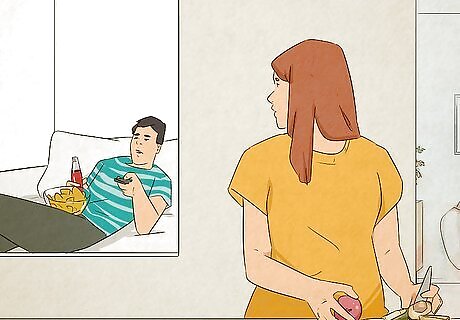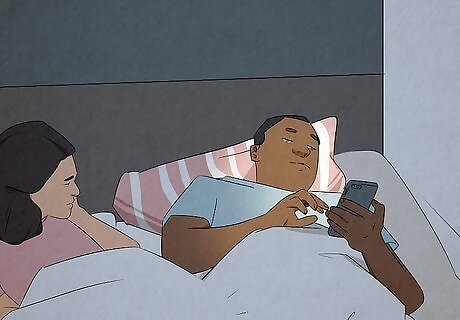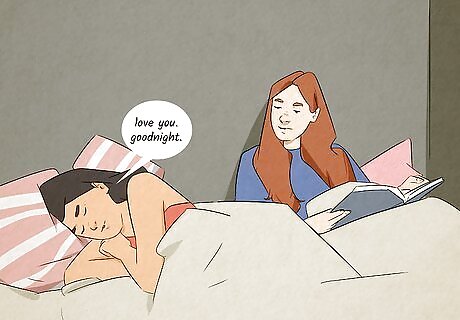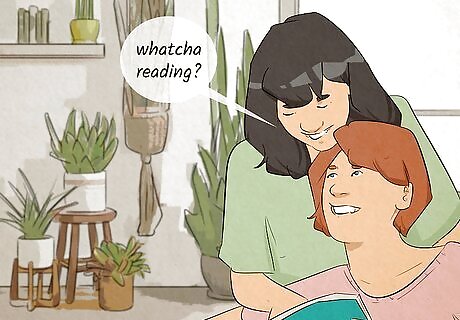
views
- Complacency in a relationship means feeling so comfortable and secure with a partner that you start losing the motivation to maintain your relationship.
- Prevent complacency in your relationship by scheduling plenty of dates and quality time with your partner and expressing your appreciation for them often.
- Watch out for signs of complacency. You may notice that spending time together becomes less of a priority, and your desire for sexual intimacy decreases.
Definition & Causes of Complacency in Relationships

Complacency means feeling so secure that you stop making an effort. Essentially, it’s a level of comfort in a relationship; complacency is when you feel overly comfortable with your partner and don’t feel you need to put extra effort into the relationship to keep it going. Getting complacent may cause you to go on autopilot and let the relationship stall. Without effort, relationships tend to deteriorate over time. Typically, couples try the hardest to impress one another at the beginning of a relationship, which is sometimes called a “honeymoon period” and tends to last anywhere from a few months to a couple of years. Complacency often develops a couple of years into a relationship, after the honeymoon period ends. Over time, partners may stop making an effort, causing the relationship to lose steam. Complacency can indicate a secure attachment to your partner and confidence that your feelings for them are mutual. However, remember that it’s still important to put effort into the relationship—not because you’re worried your partner will leave, but because they deserve your effort and affection, no matter how secure and comfortable things feel!

Complacency can lead to apathy between partners. Complacency can make partners apathetic toward one another and even cause them to fall out of love. Over time, it robs partners of their motivation to show up for one another, keep improving the relationship, communicate, and resolve conflicts. In short, complacency can make partners and spouses feel disconnected and unsatisfied in their relationship. It’s important to remember that relationships aren’t supposed to stay the same from start to finish, whether you’re together for a few months or a lifetime. People change—and as they grow, so do their relationships. Complacency interferes with that natural change, making it harder for couples to grow together.

Feeling too settled and comfortable can cause complacency. Lots of couples stumble by getting a little too complacent in a relationship. The most common cause of complacency between couples is taking one another for granted; as they settle into the relationship, they lose the urge to keep nurturing it. If complacency becomes an issue, you can still overcome it; all it takes is time and genuine effort. Some couples may get complacent because they have unresolved issues causing resentment and preventing them from being authentic around their partner. Indifference can also cause complacency if one partner is uninterested or unresponsive toward the other.
Signs of Complacency in a Relationship

Feeling indifferent to personal grooming and appearances If you’re complacent in a relationship, you may start spending less time on grooming and have lower standards for your physical appearance, even when you’re about to see your partner. For example, you might stop showering or brushing your hair before dates or show up to special events wearing casual clothes. While you certainly aren’t obligated to look flawless around your partner at all times, making an effort to look good (especially on dates and special occasions) is a sign that you also care for them.

Putting minimal effort into dates and quality time Quality time together (including regular dates) is essential to connecting with your partner. In a complacent relationship, you may notice that you don’t have nearly as many dates as you used to and that quality time is increasingly rare for you and your partner. Dates may also become pretty repetitive, with no new and exciting activities on your itinerary. Lack of quality time may also leave you feeling distant from your significant other since you don’t get as much time to catch up and stay connected with them.

Lacking sexual desire for one another You may notice that you and your partner don’t share as much sexual desire as you once did. Consider how often you and your partner are physically intimate—does it happen less than it used to? Is there a clear reason, or does it just feel like you’re drifting apart? If it’s the latter, you may be experiencing relationship complacency.

Saying “I love you” without any sentiment Affirmations of love are critical to a healthy relationship, so saying “I love you” certainly isn’t a bad thing! However, pay attention to the way you say it. Do you meet your partner’s eyes every time, say the words with emotion, and really mean them? Or do you say the words in passing without really thinking about it? Repeating the phrase “I love you” without any real emotion can cause the words to feel less meaningful over time. Each time you say it, make sure it comes from the heart!

Showing no curiosity or interest in one another’s lives Do you and your partner still ask about one another’s day? Do you ever check in with one another or stay up late chatting just because you can? Do you give them your undivided attention and put your phone down when they speak? Complacency can cause you to pay less attention to your partner and neglect to tell them what's on your mind.

Feeling bored when you’re together What do the two of you do for fun? Is there any excitement or adventure in your relationship? Complacency can cause you and your partner to fall into a bit of a rut in terms of the things you do when you’re together—and consequentially leave you feeling bored. In turn, boredom makes it harder to appreciate the good parts of your relationship.

Ignoring conflicts rather than resolving them Complacent partners and spouses tend to devote less energy toward communicating, which means problems may go unresolved. Every relationship, no matter how great, has issues—but couples in a healthy relationship work through those issues together, whereas complacent couples may let problems fester and cause more issues for them. Complacent partners may even act out around one another. Knowing they can behave badly and still be accepted by their partner sometimes causes people to lash out and be short with them—just because they know they can.
How to Overcome Complacency in a Relationship

Celebrate all big and small occasions together. Come together on anniversaries, birthdays, and important holidays. Even smaller occasions are worth celebrating—like the day one of you gets a pay raise at work, or the day you find a new home to share together. Spending those moments together may help you two remember that you’re on the same team and encourage you to work together more. For example, in a complacent relationship, you might forget to celebrate your partner's birthday or spend holidays like Thanksgiving and Christmas apart. Try to spend those occasions together instead! Don’t hesitate to ask your partner how they’d like to celebrate with you. For example, they might ask for a fancy birthday dinner with you. If you can’t spend every holiday together, get creative! For example, if you’re visiting your families separately for Christmas, plan a quick weekend getaway to celebrate before you both go.

Schedule dates and quality time to connect with one another. You and your partner need time together—more than just on special occasions! Talk about how often you want to be able to spend time together, and then carve out “couples’ time” in your schedules. The more you make time for one another, even during busy weeks, the less complacent your relationship will feel. For example, schedule a weekly date night with your partner (or create whatever schedule the two of you want—bi-weekly, three times a month, or any other configuration that works for you). Scheduled dates ensure you have time to connect with your partner, whether you’re wining and dining at the best restaurant in town or cuddling up on the couch together, talking the night away. Make more time for physical intimacy, especially if you notice less of it than usual in your relationship. Start slowly (setting the mood with romantic dates can help!) and introduce more intimacy to the relationship over time.

Be curious about your partner, their interests, and the things they love. Try shifting your mindset from complacent to curious. Don’t assume you know everything about your partner just because you’ve been together for a while! There’s always something new to learn about one another, and that’s an exciting prospect. Be curious about your partner—ask about their day, goals, and interests, and always be open to learning more. Remember, your partner is always growing and evolving as a person—just like you are. Just because they answer a question one way today doesn’t mean their answer will be the same tomorrow. As long as you're open to the idea that there’s always more to learn about your partner and discover as a couple, the connection between you will likely grow stronger over time.

Compliment your partner and express appreciation for them. Expressing gratitude and appreciation is super important; it’ll help you and your partner feel seen and prove that you each notice (and value) the things you do for one another. Make a point to share your appreciation with your partner often—whether you say it, write them a note, or pay them a thoughtful compliment. For example, you might remind your partner how much they mean to you by saying, “There’s nobody else I’d rather confide in. You make me feel so safe, and you always listen to me so thoughtfully. Thank you.” Compliments tied in with gratitude can also go a long way! For example, “Thank you for helping me rearrange my living room. You have such a great eye for design, and you really know how to brighten up a space!” You may take your partner for granted when you’re in a complacent relationship. Expressing gratitude can undo that mindset and show your partner you absolutely value and appreciate them!

Be spontaneous and shake up your routine sometimes. Adding a sense of fun and adventure to your time together can be just as important as scheduling time together in the first place! In a complacent relationship, it's easy to get caught up in the same old routine. Instead, try to shake up old patterns and try new things together! Spontaneity and adventure can help the relationship feel far less boring. For example, be a little romantic and surprise your partner with lunch or a coffee when they’re at work. Plan exciting mystery dates where you and your partner can do all the activities you’ve always wanted to try but never had the chance.

Imagine life without your partner to see just how important they are. Negative visualization is a technique that basically helps you appreciate the things you already have. Spend some time imagining what it would be like without your partner. Think of all the things you’d miss about them and all the challenges that might be harder to navigate without them. Then, consider what you want to say and do together, knowing they’re still part of your life! Ask yourself, “What do I want to experience with my partner? Do any arguments seem less important or easier to navigate now that I’ve put things in perspective?” This exercise may help you refocus on what truly matters: your partner and your relationship with them.

Acknowledge the complacency and commit to making changes. Be honest about how the relationship has been going and any signs of complacency you may have noticed lately. Reflect on your recent behavior and ask yourself, “If I were my partner, would I have any complaints? What kind of changes would I want to see?” Then, you’ll have an idea of what to start working on. Acknowledging any shortcomings you might have in the relationship isn’t always easy, but it can be very rewarding! You'll become a better partner overall when you’re conscious of the things you can improve. Don’t be afraid to ask your partner what they need from you. Try saying, “How can I help you feel more loved and cherished?” That way, you’ll know exactly what you can do to be less complacent in the relationship.

Set goals for the relationship going forward. Talk to your partner about what each of you expects from the relationship and how you want to improve it over time. Set relationship goals that prevent complacency and actively hold one another accountable for those goals as you move forward. That way, you’ll both be able to track your progress! For example, you might set a goal to build up physical intimacy over the next 3 months or work up to having 2 date nights each week by the end of the year. Remember: it's okay if you and your partner miss a goal from time to time. The most important thing is that you keep trying and work through rough patches as a team. If you can do that, your relationship is on the right track.




















Comments
0 comment